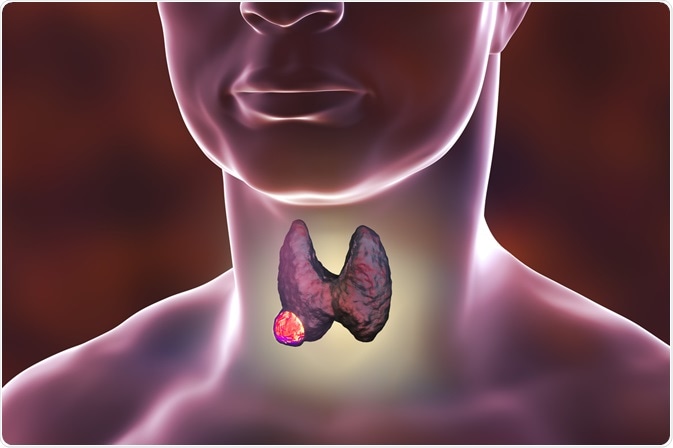Upon diagnosis of thyroid cancer, a treatment plan should commence immediately to regain control of cellular growth and to prevent it from spreading.
The specific treatment for each individual suffering from thyroid cancer usually depends on the type of thyroid cancer and its stage. Papillary and follicular carcinomas usually have a relatively good prognosis and are treated in a similar way. Medullary and anaplastic thyroid cancer typically require a more aggressive treatment plan.

Image Credit: Kateryna Kon / Shutterstock
Multidisciplinary Approach
The treatment of thyroid cancer typically involves various health professionals that work together to provide cohesive care.
A surgeon, an endocrinologist, an oncologist, a pathologist, a radiotherapist and nurses all often play an important role in managing a patient's thyroid cancer. In the recovery period following treatment, other health professionals such as a speech pathologist and occupational therapist may also contribute to the patient's care.
Thyroidectomy Surgery
The vast majority of thyroid cancer cases require the surgical removal part or all of the thyroid gland. The cancer type and level of progression influence this decision and some cases also require the removal of lymph nodes in the neck.
The surgical procedure takes approximately two hours and is conducted with the patient under general anesthetic. A small incision is made in the neck to access the thyroid gland for removal. While in most cases, this simply causes a small scar, some people experience permanent hoarseness of the voice following surgery.
Radiotherapy
Radiotherapy is often recommended as adjuvant therapy following surgical removal of the thyroid gland, although in some cases it may also prove useful as the primary treatment method.
As it is a localized therapy, it can effectively target any remaining cancer cells in the area and reduce the probability of relapse. The radiation can be administered with either an external X-ray beam directed towards the area or by taking radioactive iodine by mouth.
Most people do not notice any immediate effects of radiation therapy, although some patients have reported tightness, pain or swelling in the neck and feeling flushed. However, these effects usually subside within 24 hours following treatment.
Chemotherapy
When thyroid cancer has metastasized to affect other areas of the body, chemotherapy is often used to help control the growth of cancerous cells.
It is a generalized treatment, meaning it is not targeted to the throat region and the entire body experiences the effects. Side effects may include, nausea, vomiting, fatigue, loss of appetite, alopecia and mouth ulcers. Additionally, patients receiving chemotherapy are more vulnerable to infections and should be advised to recognize signs of an infection, such as fever.
Hormone Replacement Therapy
As the treatment of thyroid cancer usually involves the removal of part or all of the thyroid gland, the hormones that are normally produced by the thyroid gland responsible for the regulation of the metabolic system are altered.
This leads to symptoms of hypothyroidism in almost all patients, such as fatigue, weight gain and dry skin. As a result, hormone replacement therapy is recommended for all patients following the removal of the thyroid gland, which continues for the duration of life.
Thyroxine (T4) is the standard hormonal drug given to patients following removal of the thyroid gland, although triiodothyronine (T3) is preferred if radiotherapy is to commence shortly.
It is important that people taking hormone replacement therapy have regular blood tests to ensure the hormonal levels are in the normal range and the dose is sufficient. It often takes a few weeks or months to find the optimal dose for an individual, which then stays relatively constant unless there are significant life changes.
References
Further Reading
Last Updated: Feb 10, 2021